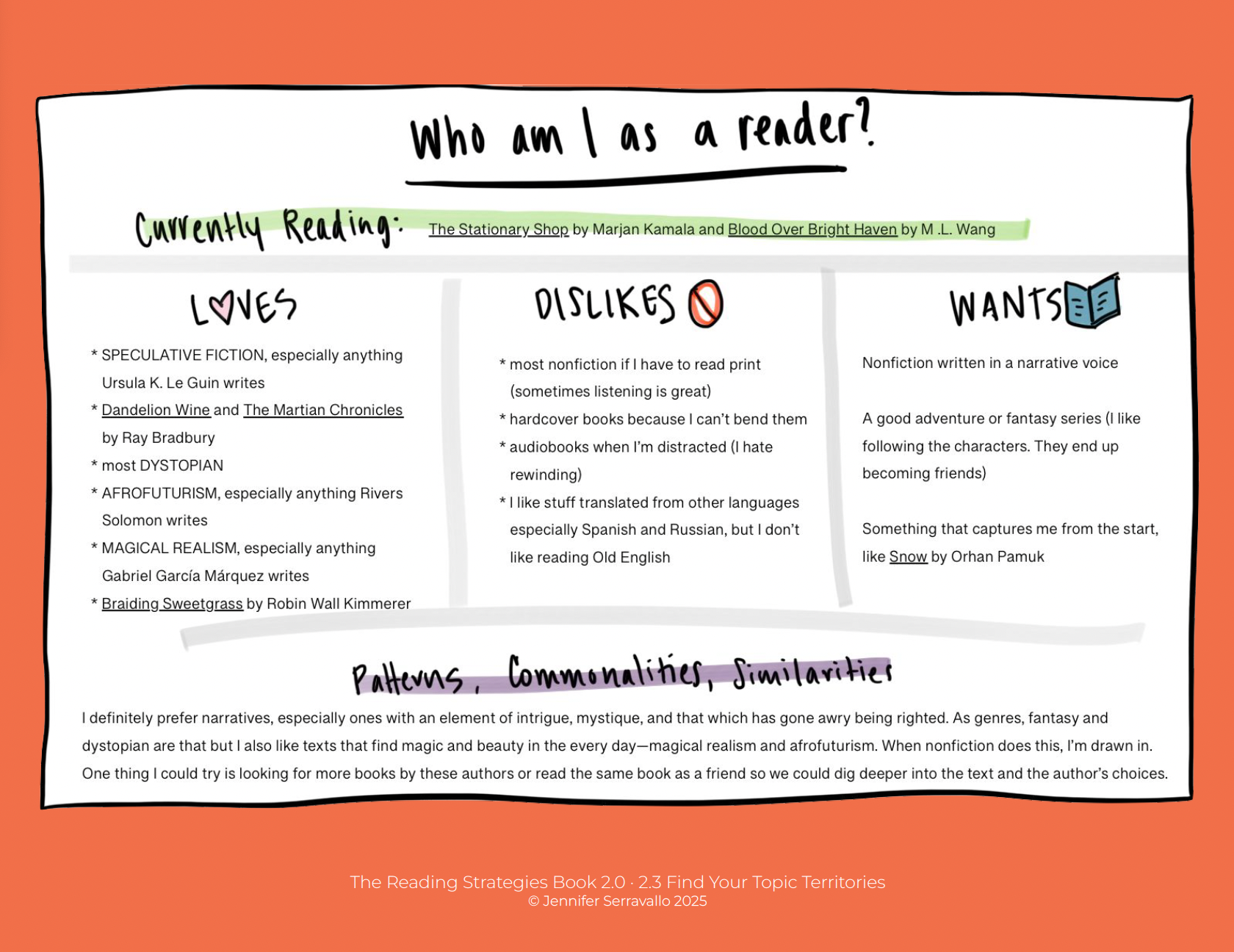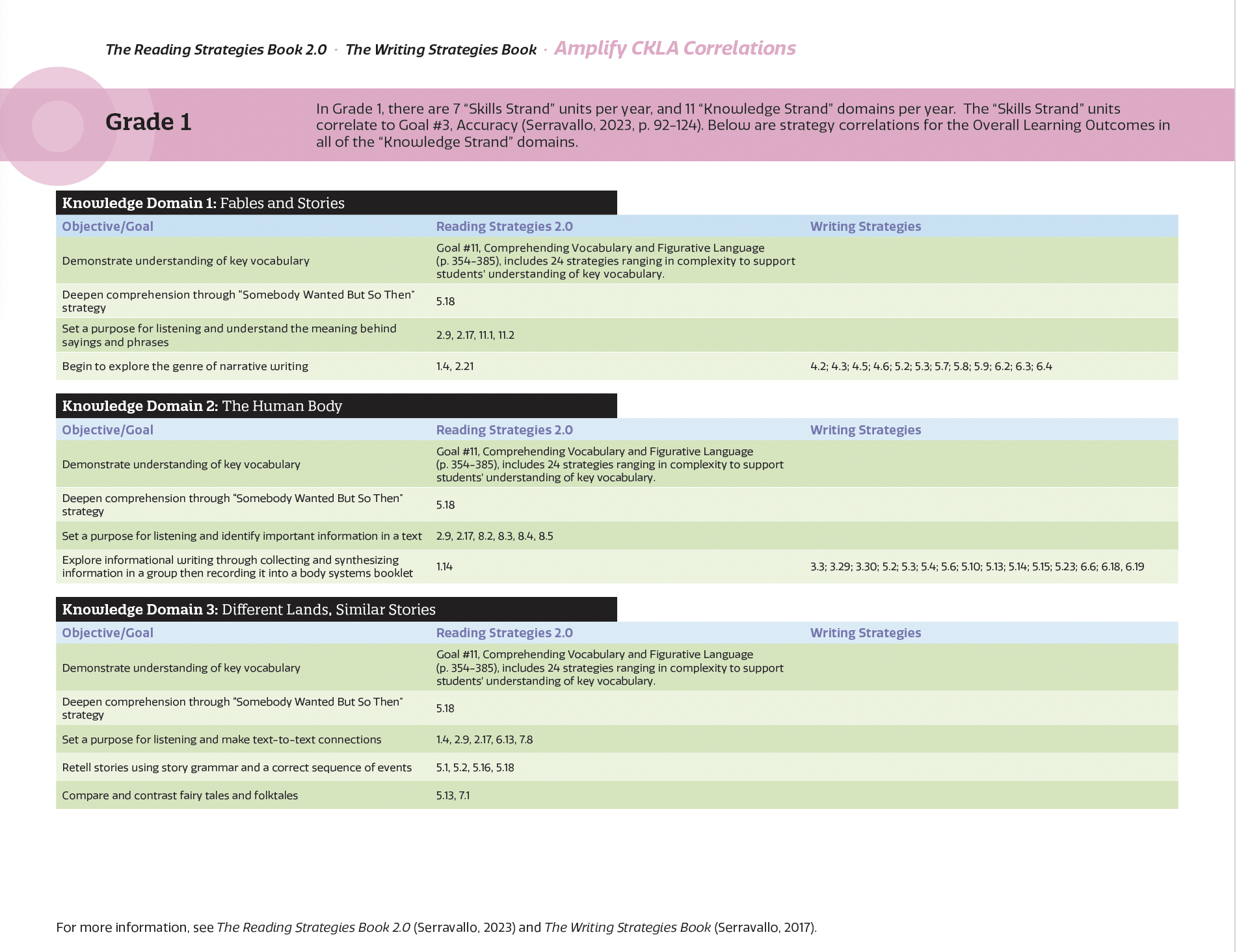 Image 1 of 3
Image 1 of 3

 Image 2 of 3
Image 2 of 3

 Image 3 of 3
Image 3 of 3




Charts for The Reading Strategies Book 2.0: High School Adaptations
The Reading Strategies Book 2.0 can be an amazing resource for high school teachers with some slight tweaks -- change up a mentor text, an example, and the classroom anchor chart/slide you use when you teach. Luckily, Sara Gretina-Diana, approved literacy specialist for Jennifer Serravallo, has worked to adapt 40 high-leverage reading strategies from the book and has created ready-to-use PDFs you can upload into your slide deck and use right away. Great for English Language Arts Teachers, History teachers, Science teachers...all teachers should teach these strategies!
Included in this collection are FORTY secondary-adapted slides for the following:
ENGAGEMENT AND MOTIVATION
2.3 Find your Topic Territories
2.9 Read with a Purpose in Mind
2.21 Prime Yourself with Prior Knowledge
2.24 Ask Questions as You Read
ACCURACY
3.2 Check the Beginning, Middle, and End
3.10 If You Slowed to Decode, Go Back Over the Road
FLUENCY
4.12 Mind the Ending Punctuation
4.17 Read with Emphasis: Infer from Context
UNDERSTANDING PLOT & SETTING
5.9 Tap Into Title Power
5.10 Let the Blurb Help You
5.13 Form Genre-Based Expectations of the Plot
5.31 Analyze Historical Context
UNDERSTANDING CHARACTER
6.5 Think about How the Character is Feeling
6.7 Add Text Clues and Background Knowledge to Get Ideas
6.8 Study Talk and Actions as Windows into Traits and Feelings
6.14 See More than One Side
UNDERSTANDING THEME
7.2 Give Advice to the Character
7.4 Learn from Character Changes
7.21 React to What's Unfair
UNDERSTANDING TOPICS & MAIN IDEAS
8.2 Notice what Repeats
8.6 Name the What and So What
8.10 Sketch Each Chunk, Then Put the Pieces Together
8.13 Consider Structure to Find Main Idea(s)
UNDERSTANDING KEY DETAILS
9.4 Monitor for Clicks and Clunks
9.6 Slow Down for Numbers
9.10 Ask: How Do I Know?
UNDERSTANDING TEXT FEATURES
10.6 Get More from Photographs
10.10 Use Text Features to Learn New Words
10.16 Explore Maps
10.23 Study What Diagrams Show and Tell
UNDERSTANDING VOCABULARY & FIGURATIVE LANGUAGE
11.1 Be Word Conscious and Curious
11.12 Look for Word Part Clues: Prefixes and Suffixes
11.13 Look for Word Part Clues: Roots and Bases
CONVERSATION
12.1 Set Yourself Up to Listen
12.2 Say Back What You Heard
12.4 Jot, Follow, Fit
12.18 Try an Idea on for Size
WRITING ABOUT READING
13.2 Take Notes to Remember Text Details
13.9 Extend Your Thinking
13.10 Prompt Your Thinking with Transitions
The Reading Strategies Book 2.0 can be an amazing resource for high school teachers with some slight tweaks -- change up a mentor text, an example, and the classroom anchor chart/slide you use when you teach. Luckily, Sara Gretina-Diana, approved literacy specialist for Jennifer Serravallo, has worked to adapt 40 high-leverage reading strategies from the book and has created ready-to-use PDFs you can upload into your slide deck and use right away. Great for English Language Arts Teachers, History teachers, Science teachers...all teachers should teach these strategies!
Included in this collection are FORTY secondary-adapted slides for the following:
ENGAGEMENT AND MOTIVATION
2.3 Find your Topic Territories
2.9 Read with a Purpose in Mind
2.21 Prime Yourself with Prior Knowledge
2.24 Ask Questions as You Read
ACCURACY
3.2 Check the Beginning, Middle, and End
3.10 If You Slowed to Decode, Go Back Over the Road
FLUENCY
4.12 Mind the Ending Punctuation
4.17 Read with Emphasis: Infer from Context
UNDERSTANDING PLOT & SETTING
5.9 Tap Into Title Power
5.10 Let the Blurb Help You
5.13 Form Genre-Based Expectations of the Plot
5.31 Analyze Historical Context
UNDERSTANDING CHARACTER
6.5 Think about How the Character is Feeling
6.7 Add Text Clues and Background Knowledge to Get Ideas
6.8 Study Talk and Actions as Windows into Traits and Feelings
6.14 See More than One Side
UNDERSTANDING THEME
7.2 Give Advice to the Character
7.4 Learn from Character Changes
7.21 React to What's Unfair
UNDERSTANDING TOPICS & MAIN IDEAS
8.2 Notice what Repeats
8.6 Name the What and So What
8.10 Sketch Each Chunk, Then Put the Pieces Together
8.13 Consider Structure to Find Main Idea(s)
UNDERSTANDING KEY DETAILS
9.4 Monitor for Clicks and Clunks
9.6 Slow Down for Numbers
9.10 Ask: How Do I Know?
UNDERSTANDING TEXT FEATURES
10.6 Get More from Photographs
10.10 Use Text Features to Learn New Words
10.16 Explore Maps
10.23 Study What Diagrams Show and Tell
UNDERSTANDING VOCABULARY & FIGURATIVE LANGUAGE
11.1 Be Word Conscious and Curious
11.12 Look for Word Part Clues: Prefixes and Suffixes
11.13 Look for Word Part Clues: Roots and Bases
CONVERSATION
12.1 Set Yourself Up to Listen
12.2 Say Back What You Heard
12.4 Jot, Follow, Fit
12.18 Try an Idea on for Size
WRITING ABOUT READING
13.2 Take Notes to Remember Text Details
13.9 Extend Your Thinking
13.10 Prompt Your Thinking with Transitions















